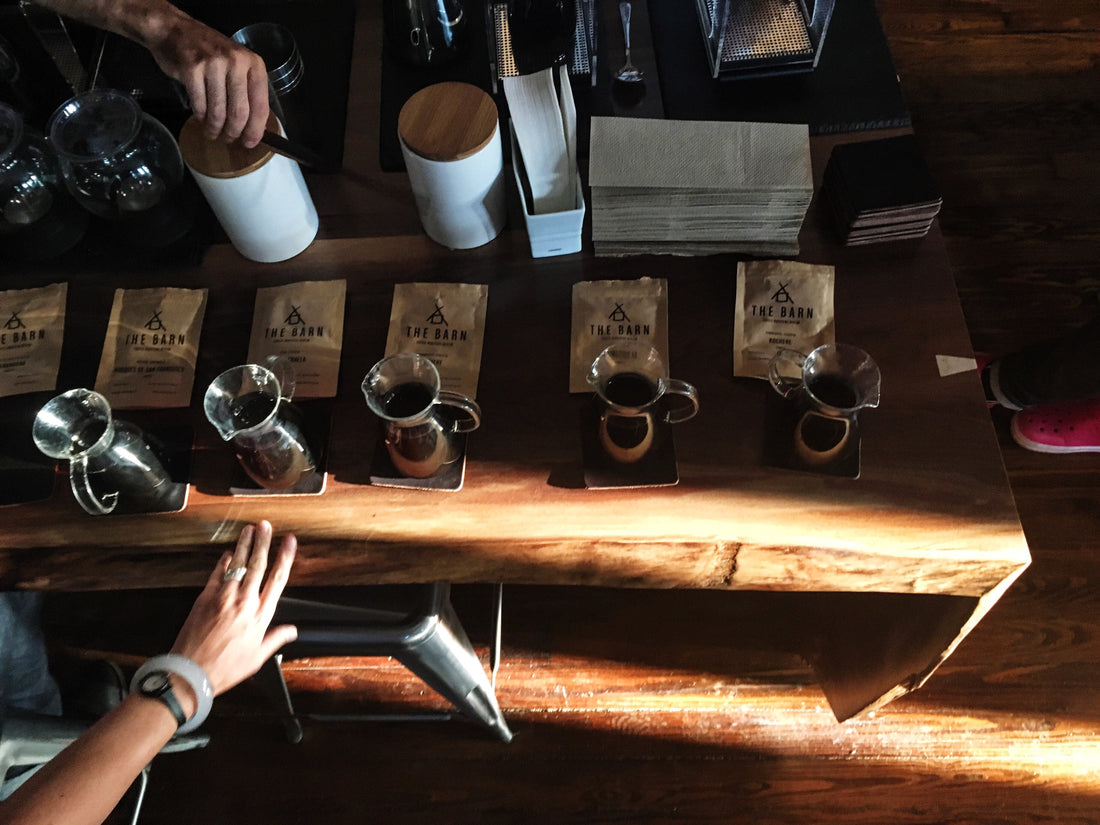
At Sump, we know we’re not alone in the process of carefully and thoughtfully sourcing and roasting coffees from all around the world - that’s why we’ve introduced an internal program among Sump staff that we like to call 12 Roasters. Every month, we select a roaster we’re interested in to sample their coffee - both to experience coffee from other roasting machinery, as well as taste how other companies choose to highlight the terroir of their beans. In selecting roasters to sample as a part of our 12 Roasters program, we’ve been focusing on the following:
- Roasting companies and styles that overlap with what we do at Sump
- Roasters with clear links/identity to the machines on which they roast
- Roasters sourcing from similar origins from which we also source
- Media trending shops
Our most recent selection for 12 Roasters was The Barn, based in Berlin. They roast their coffee pretty lightly to showcase the individual terrior of coffees, and they do so on an overhauled 1955 Probat. We’ve heard good things about their coffee, so we decided to practice the limits of our patience (international coffee orders can easily get tied up in customs) and place an order with the good folks of the Barn. We ordered a sample pack of coffees that included 3 espresso roasts and 3 filter roasts.
Below you’ll find our discussions about and reactions to the individual coffees.
ESPRESSO ROASTS
Kochere Espresso Roast [Ethiopia]
Jordan: Alright, which coffee are we trying?
Dylan: This is the Kochere natural Ethiopia. Espresso roast!
[The baristas let out a chorus of “hmmmmms”]
Scott: It’s very clearly natural.
Jordan: Natural funk
Connor: It almost tastes like it’s off-roast, like it was just pulled out of the roaster.
Matt: There’s a little development on the back, like it was made for espresso.
Dylan: Oh, I like this!
Matt: I do too. It plays well.
Scott: There’s a really hard seed bitterness to this, like on the finish - it’s dry, appleseed-y.
Matt: There’s a good mid-palate sweetness, and it does finish dry.
Dylan: Less chocolate than some of the other beans we’ve tried.
Scott: And not so much moisture, like less earthy. It’s clean, it’s clearly a natural, seed bitter. It’s got pretty good weight. I don’t think you’d have to call this an espresso roast.
Dylan: This is their espresso roast though. It’s crazy.
Matt: It’s pretty cool.
Dylan: If this is what they’re doing it’s pretty cool. From looking at their beans, I couldn’t even tell a distinction.
Scott: I couldn’t either - I wonder how they pull it. This is as dark as they go you think?
Dylan: Let’s wait to see after we try the Guatemala.
La Bandera Espresso Roast [Costa Rica]
Matt: Something smells like a Baby Ruth to me, in a good way.
Scott: There’s something legume-y about this though - earthy. Peanutty.
Matt: Oh, this is good! It’s sweet and challenging. Peanuts and caramel.
Dylan: It’s too nutty for me.
Jordan: I was going to say salted caramel.
Scott: There is a savory aspect to the coffee.
Sara: I really like this.
Scott: I never bought nougaty or nutty candy bars. Not Milky Way, not Baby Ruth. What saves Snickers is the caramel.
Unidentified barista: Let’s pour one out for Snickers!
Bosques De San Francisco Espresso Roast [Guatemala]
Scott: There’s brightness in this, and I bet it’s the workhorse of the shop.
Jordan: Tobacco and green pepper?
Scott: Vegetal, very vegetal. It’s herbacious and tobacco-y.
FILTER COFFEES
Nano Challa Filter Roast [Ethiopia]
[Team Sump spends a few minutes trying to decipher the German tasting notes on the back of the package]
Dylan: Peach?
Scott: It is peach.
Dylan: I took two years of German in high school and I don’t remember anything.
Jordan: This is the one that was really light in the Hario pitcher, right? Oh, it smells really nice.
Scott: This is a really overused word, but it’s rooibos-y, with lots of stonefruit.
Matt: I get more plum, as opposed to peach.
Scott: Dry!
Dylan: This is good.
Scott: Rose hips tea, clean tea, floral.
Jordan: I think we use the work esthery in situation like this, right? It’s more of a smell.
Scott: Oh yeah, like perfumey, esthers.
Robert: There’s hardly any chocolate in this, but it’s pretty bold.
Scott: There’s no black pepper, peppercorn, or earth in this. Clean, high notes.
Robert: How do we get more of this?
Kochere Filter Roast [Ethiopia]
Dylan: Hmmm. Jolly Ranchers.
Matt: It’s definitely juicier, with red fruit. This is the first one and it fell out at 2:20.
Scott: Very fleeting.
Matt: I’d use the word esthery with this one. It’s so delicate.
Jordan: I feel like there’s almost more in the smell than in the taste with this one.
Dylan: I’m gonna wear this as cologne tomorrow.
Matt: I’d say strawberry, rose hip, elegant.
Dylan: Elegant is a tasting note?
Matt: It says “clean, floral, and juicy.”
Scott: Elegant is not a tasting note. Like a Jolly Rancher, it does have that mid-palate linger.
Robert: I like this.
Scott: What did it smell like when you ground it?
Matt: Not as floral.
Jordan: I’d like to taste this one closer to its roast date.
Dylan: When was this roasted?
Scott: June 6th.
[collective groaning]
Ngunguru Filter Roast [Kenya]
Dylan: Super tomatoes.
Scott: It doesn’t even have that classic, juicy ripe heirloom tomato taste that can be characterized as sweet. This is more tomato paste than tomato vine.
Dylan: There’s hardly any brightness.
Scott: No dryness, no cranberry.
Jordan: There’s not even any chocolate in this cup - it’s just tomato.
Robert: I like what they’re trying to do, but it tastes watered down.
Some final, overall thoughts from Team Sump:
Jordan: I feel like the winner was the Nano Challa.
Matt: I like that and the Costa Rica.
Scott: Yeah, the Nano Challa is a great coffee. Overall, they were all very developed coffees. Nothing was charred or tipped. Maybe the airflow or age of the coffees were not that exciting.
Robert: What are they roasting on?
Scott: I think they’re roasting on a Probat. I’d be curious to have an espresso of the natural. It’d be interesting, depending on how they extracted it.

